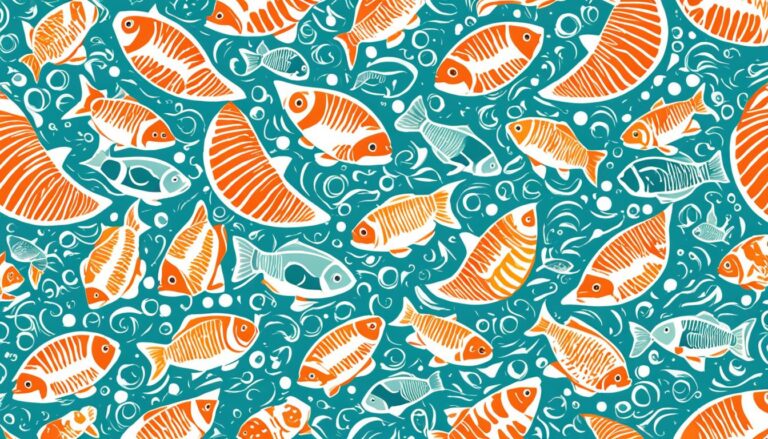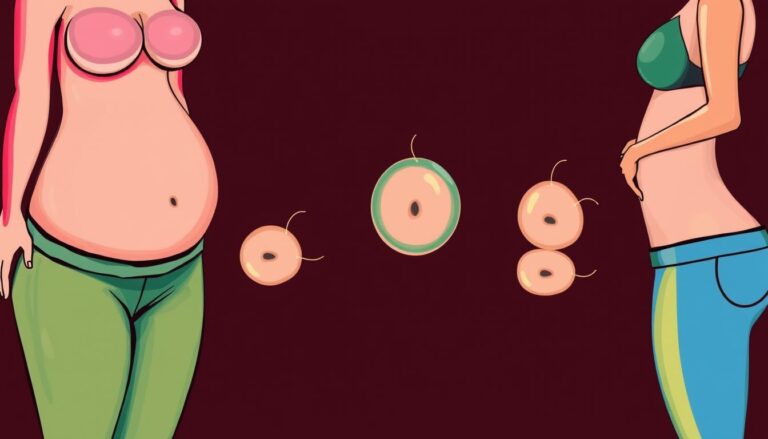Picture a place where meat is king. Just the thought of a veggie makes you cringe. This is the world of the carnivore diet. It’s a way of eating that makes us question what we know.
Is it the secret to being super healthy? Or a risky food adventure? We’re going to explore the truth about the carnivore diet.
Key Takeaways
- The carnivore diet cuts out all plant foods, focusing only on animal products. This includes meats, eggs, and dairy.
- There’s no solid evidence showing the carnivore diet can solve health problems. Plus, it’s missing key nutrients like fiber and antioxidants.
- It’s loaded with fats, bad cholesterol, and salt. These could up your chances of heart issues.
- Short-term weight loss might happen on the carnivore diet. But we’re not sure if it’s good for you over time because there isn’t much research.
- Experts worry that it could lead to not getting enough essential nutrients because it’s so limited.
What is the Carnivore Diet?
The carnivore diet is a way of eating that cuts out all plants. It only includes meat, fish, and animal products. You won’t eat fruits, vegetables, or grains on this diet. This makes it very restrictive.
People who follow this diet believe it can help with many health issues. These include depression, anxiety, arthritis, and obesity. However, there is little scientific proof that it really does.
Elimination of All Plant Based Foods
The carnivore diet means no plant-based foods at all. That means no fruits, veggies, nuts, or seeds. Followers eat only animal foods like meat, fish, and eggs.
They believe this diet imitates what our ancient ancestors ate. They think this way of eating is the healthiest for us.
Proponents Claim Health Benefits
Supporters of the carnivore diet say it can help with depression, anxiety, and various health problems. Yet, there isn’t much solid proof supporting these claims. Studies are not well-controlled.
Most of the research is based on what people say about the diet. This includes surveys, which can be unreliable. They don’t compare to scientific clinical trials.
Zero Carbs and High Protein
The key difference with the carnivore diet is the total avoidance of carbs. Unlike keto or paleo, there is no room for carbohydrates here. It’s all about a high-protein animal diet.
This way of eating is thought to bring health benefits by mimicking our ancient lifestyle. Supporters believe it’s better than a diet high in carbs.

Foods Allowed on the Carnivore Diet
On the carnivore diet, you eat only meat, fish, and eggs. You also have a bit of low-lactose dairy. This includes beef, chicken, pork, and more. You can also enjoy organ meats and fish like salmon and sardines.
Small amounts of heavy cream and hard cheese are allowed. You can use butter, lard, and bone marrow too.
Meat Beef Chicken Pork Lamb
Those on the carnivore diet often choose fattier meats. They need these for energy. This means eating plenty of beef, pork, and lamb, as well as chicken.
Organ Meats Liver Kidney Heart
People on the carnivore diet are also big fans of organ meats. This includes liver, kidney, and heart. Eating these ensures they get the vitamins they need.
Fish and Seafood
Alongside meat, you can have fish and seafood on this diet. Foods like salmon and sardines are great for omega-3. They provide healthy fats.
Eggs and Low Lactose Dairy
Even though most dairy is off the table, some options are okay. You can have a bit of hard cheese and heavy cream. Eggs are a big part of this diet too.
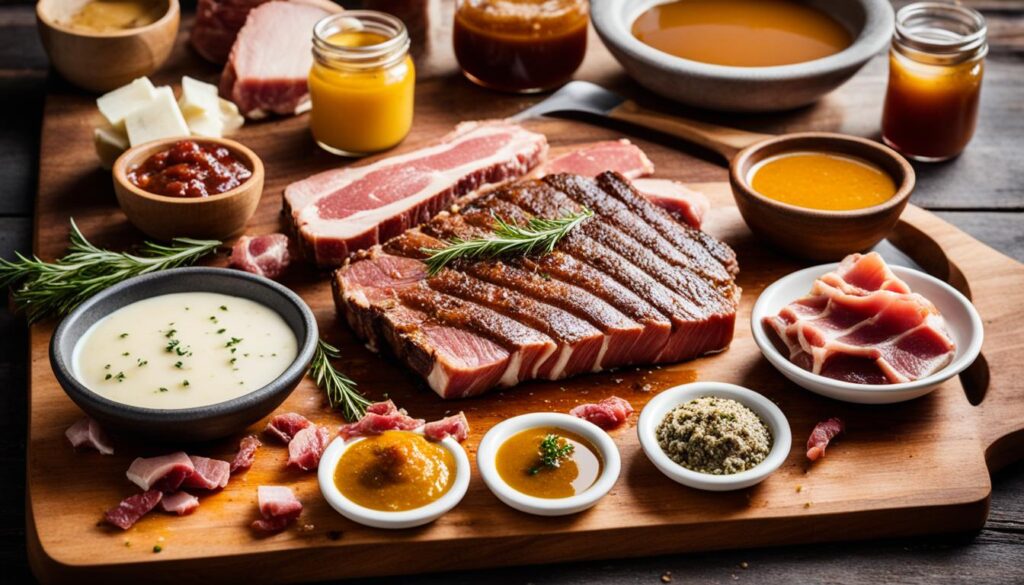
Foods Restricted on the Carnivore Diet
The carnivore diet cuts out all plant-based foods. This includes fruits, vegetables, grains, legumes, nuts, and seeds. It also says no to plant-based oils, drinks, and most dairy products.
Fruits and Vegetables
No vibrant fruits or nourishing vegetables are allowed on the carnivore diet. This rule applies to bananas, apples, oranges, broccoli, spinach, and all produce not from animals. These foods are known for fiber, vitamins, minerals, and antioxidants.
Grains and Legumes
Certain grains and legumes are off the menu on the carnivore diet. Foods like quinoa, brown rice, and oats, along with lentils, beans, and peas, are not allowed. The diet cuts out complex carbohydrates found in these plant-based items.
Nuts and Seeds
Nutrient-packed nuts and seeds like almonds, walnuts, and chia are not part of the diet. The diet avoids their essential fats, fiber, and many plant compounds.
Plant-Based Oils and Beverages
All plant-based oils and drinks are forbidden on the carnivore diet. This includes olive oil, tea, and coffee. Water and animal-based drinks are the only ones allowed.

Potential Weight Loss Benefits
Some parts of the carnivore diet might help with losing weight. High-protein and low-carb meals can make you feel full longer. This can help eat less and lose weight.
Also, protein speeds up your body’s calorie burning. So, the carnivore diet might help you eat less in the short term. Yet, it’s really hard to stick to this diet for a long time.
High Protein and Low Carb Diets Aid Weight Loss
Research shows these diets may help you shed pounds. In a study with 132 people who were overweight or obese, those eating more protein lost more weight and fat.
Increased Satiety and Reduced Calorie Intake
Focusing on protein and fat in the carnivore diet can make you feel full and happy after eating. This can lower the total number of calories you eat and help you lose weight. Plus, protein can make your body burn more calories, aiding in weight loss.
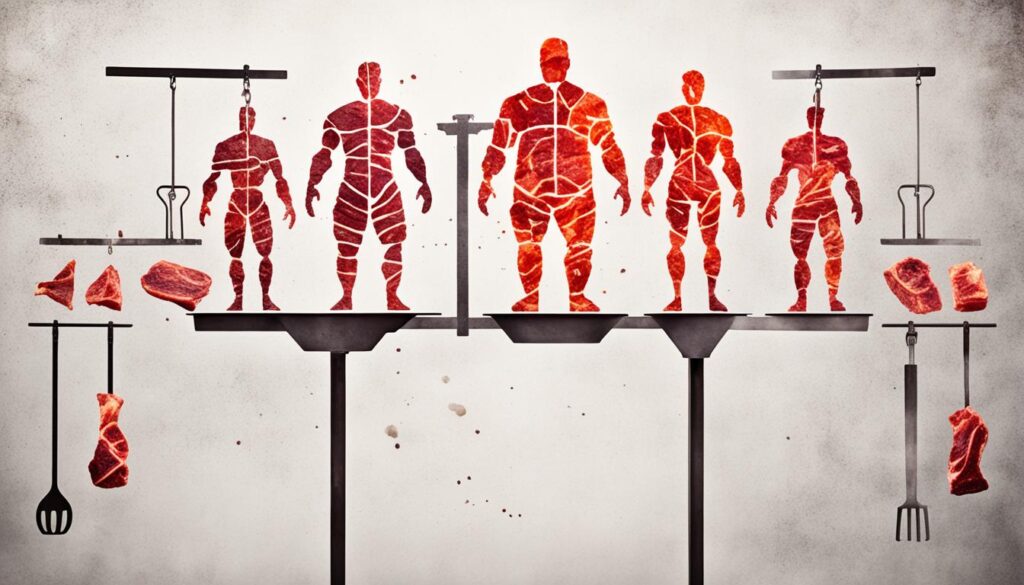
Nutritional Concerns and Downsides
The carnivore diet is highly restrictive, cutting out most food groups. This leads to nutritional concerns. By not including fruits, vegetables, legumes, and whole grains, the diet misses out on essential vitamins and minerals. These plant-based foods offer lots of beneficial elements.
While meat is good for us, a balanced diet needs more than just that.
Lack of Fiber and Plant Nutrients
A meal plan focused on animal products only leaves out fiber and nutrients from plants. This is bad for our health. Fiber helps our digestion, keeps our gut healthy, and lowers the risk of some diseases.
The lack of fruits, vegetables, and plants on the carnivore diet means we miss out on antioxidants and more. These are essential in fighting off chronic diseases.
High in Saturated Fat and Cholesterol
The carnivore diet uses a lot of animal products, so it’s rich in saturated fat and cholesterol. This can lead to heart issues, the biggest cause of death worldwide. In contrast, diets heavy on plants are known to reduce these risks.
Potential for Nutrient Deficiencies
A strict diet like the carnivore one can cause us to lack important vitamins and minerals. Not eating fruits, veggies, and grains can mess with our body’s acid-base balance. This might lead to kidney issues and diabetes.
Deficiencies in vitamins like A, C, and B12 are often seen in people on the carnivore diet.
Following the Carnivore Diet
The carnivore diet is unlike some diets you might have heard of. It doesn’t focus on how much or when to eat. Instead, it encourages eating only approved animal foods. Plus, there are no limits on when or how often you eat. This means you can eat as much as you want, without worrying about calories or portion sizes.
No Calorie or Portion Guidelines
One challenge of the carnivore diet is the lack of rules on how much to eat. Without clear advice, it’s easy to eat too much meat. This could lead to weight gain or health problems you didn’t plan for.
Eat as Often as Desired
On this diet, you have the freedom to eat whenever and however much you want. This might sound great, but it can be hard to find a healthy balance. Without limits on meal times or portion sizes, you might end up eating too much. This could mess with your nutrition and health.
Social and Practical Challenges
The strict rules of the carnivore diet can make dining out or going to social events hard. You’re basically limited to eating certain animal foods. It’s tough to stick to the diet when everyone else is eating meals that aren’t just animal products. This can be especially tricky in social situations with shared meals.

Potential Health Risks
The carnivore diet has short-term ups but many downs. It focuses on meat and animal products only. This can hurt the liver and kidneys because of too much protein. This can lead to liver and kidney problems over time.
Kidney and Liver Strain
The diet puts a lot of stress on the kidneys and liver. It’s mainly because of how much protein it includes. This might increase the chances of getting kidney stones or other kidney problems.
Increased Risk of Heart Disease
High amounts of saturated fat and cholesterol are big worries with the carnivore diet. It has no place for good plant fats, sticking to bad fats from animals. This might lead to more heart issues, strokes, and bad news for the heart.
Lack of Essential Nutrients
This diet’s big flaw is it cuts out all plant foods. This means missing out on key vitamins, minerals, and plant nutrients. Not getting these might lead to lack of fiber, vitamin C, and more. It’s hard to stay healthy and keep diseases away without these.

Alternatives to the Carnivore Diet
Looking for a better way than the carnivore diet? Consider other options like the ketogenic or paleo diets. These plans also keep carbs low but offer a variety of healthy foods. They are better than cutting out whole food groups entirely.
Ketogenic Diet
The ketogenic diet is low in carbs and high in fats. It aims for 5-10% of daily calories from carbs. This way of eating can put the body in a state where it burns fat for energy. It is different from the carnivore diet because it includes some plant foods.
Paleo Diet
The paleo diet focuses on natural, unprocessed foods. It allows meat, fish, eggs, veggies, fruits, nuts, and seeds. However, it cuts out grains, legumes, dairy, and processed sugars. This plan offers a good mix of nutrients without being all meat like the carnivore diet.
Low-Carb or Moderate-Carb Diets
Low-carb or moderate carb options are out there for those seeking balance. They include plenty of healthy, whole foods. These diets are lower in carbs but still welcome various plant foods like veggies, fruits, and grains. It’s a balance worth exploring.
Although the carnivore diet has its merits, its strict approach and lack of certain nutrients put it under question. Opting for low-carb or moderate-carb plans that embrace a variety of foods might be a best middle ground. These include the benefits of reducing carbs but without the extreme food group cuts.
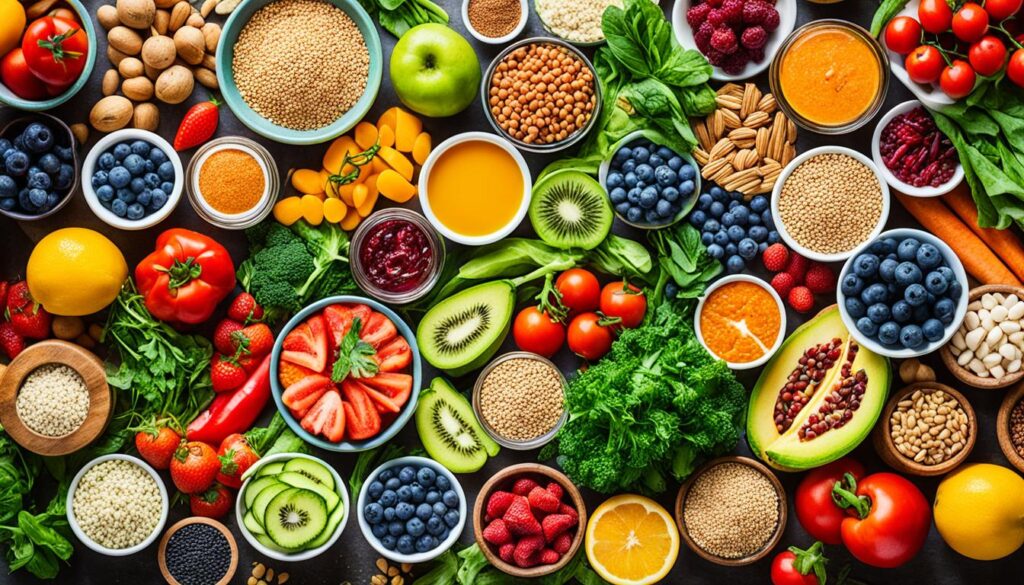
Conclusion
In wrapping up, the carnivore diet is super strict. It cuts out all plants and focuses only on animal foods. This style can cause quick weight drop because it’s rich in protein and low in carbs.
However, it has many negatives and health dangers. These include missing out on fiber and good plant stuff, too much unhealthy fat and cholesterol, lacking some necessary nutrients, and finding it hard to keep up over time. Because of these big problems, experts in nutrition say the carnivore diet isn’t a good idea.
Instead, going for diets that are either low or moderate in carbs, but include a mix of nutrient-packed whole foods might be better. They offer similar benefits like the carnivore diet without cutting out whole food groups. Always smart to talk to a health expert when you change how you eat. This makes sure you’re still getting all the good stuff your body needs.
While some might support the carnivore diet, the proof points to a different option. Going for a diet that’s more balanced and plant-focused is usually best. This way, you can ingest a wide range of nutrients and vitamins, which is good for health goals. Plus, it lowers the dangers linked with the carnivore diet.

